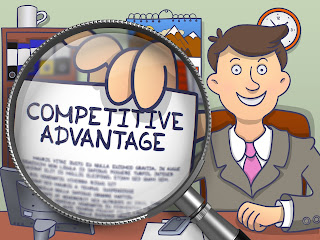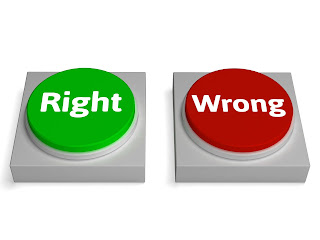Today I broke a personal record.
It was on a stationary bike at my local gym.
I gave a complete and total effort in the attempt.
It was enormously satisfying.
 |
| Self-action leaders are always focused primarily on Intra-personal competition, meaning competition with oneself. |
In my experience, there are few things more rewarding or fulfilling than doing better than your previous best at something. Accomplishing such a feat is, in my view, the summum bonum (the ultimate good) of intra-personal competition.
What is INTRA-personal competition, you ask?
Intra-personal competition refers to competition with yourself—in contrast to competing against others—and is the essence of Self-Action Leadership. As a self-action leader, the goal is never primarily to beat someone else at something, even thought that may be a secondary or tertiary intention. The primary purpose of Self-Action Leadership is—and always will be—to learn, grow, and progress PERSONALLY, which often involves eclipsing your own best performances from the past.
Unfortunately, we live in a world that is often overly obsessed with inter-personal competition, meaning competition with other people. In this culture, beating others and finishing #1 is viewed as being very important, if not essential. This pessimistic cultural paradigm may even posture second place as being "the first loser," with third, fourth, and fifth place, etc., carrying even lesser status.
There is nothing inherently wrong with interpersonal competition. It can serve a variety of positive purposes, including spurring a self-action leader to become more intra-personally competitive.
A primal problem with inter-personal competition, however, is that with very few exceptions there is always going to be someone bigger, stronger, faster, smarter, fitter, or more talented, attractive, or wealthy than YOU are. As such, if you spend too much time comparing yourself to others, you will find yourself perpetually distracted and/or disappointed in your own self-achievement, which not only hampers your individual performance, but is a sure-fire recipe for unhappiness."Comparison is the thief of joy."
— Theodore Roosevelt
I learned this lesson the hard way back in high school and college as a competitive cross-country and track middle distance athlete.
Click HERE to read my prep athletic story.
Fortunately, I did learn my lesson, and am now much more content with focusing on intra-personal competition as opposed to inter-personal competition. This fact helped make this morning's personal record all the sweeter because I wasn't competing against anyone else except my own previous best performances.
So... what record did I break?I broke my personal record (PR) for 10 kilometers peddled on a stationary bike at the local gym where I work out. I joined the local gym about two months ago after moving to Florida. When I first started timing myself at the 10k distance, my initial best time was approximately 17 minutes and 30 seconds. But bit-by-bit, I got faster, stronger, lighter, and more ambitious and confident. As I did, my times got incrementally faster.
My goal today was to break 16-minutes for 10K. My previous best was 16:04. I gave it a complete effort from start-to-finish—man it always feels AMAZING to "leave it all on the track" like that—and managed to set a new personal record and just barely achieve my goal of breaking 16-minutes in the process.
What was my time?15 minutes and 58 seconds (15:58.67 to be exact)—a 90 second improvement over my best effort just two months ago.
While playing this intra-personal "game" with myself over the past two months, I have gotten in better shape and lost nearly 10 pounds of COVID-19 and MOVING fat. I also feel stronger and healthier than I did after the prolonged moving process I experienced in January, February, and March of this year as we relocated from New Mexico to South Florida.
Throughout this process, I had a lot of FUN using my IMAGINATION.
How did I do that?
In my mind's eye, I continually viewed myself as a world-class biker breaking actual world records. In truth, my personal best is far afield of any real world records, and always will be. But oh the fun I had in the process of focusing on my own personal improvement, health, and fitness along the way!
So while it may not have been a world-class performance when compared to elite bikers, it was unquestionably a Jordan-class performance when compared to my previous best efforts, which, as it turns out, has the potential to provide a similar positive psychological experience to my psyche. And I felt like a million bucks as a result.
This experience—and the fun, satisfaction, fulfillment, and joy engendered thereby—is a classic example of a Self-Action Leadership exercise or endeavor. The goal of SAL is much more than merely getting better at something. Its purpose is to find creative ways to enjoy the process of self-improvement and have as much fun along the way as possible. Hard work doesn't always have to be drudgery. There are things we can do and steps we can take to sweeten the difficulty of a challenge, journey, or other opportunity. In the words of Mary Poppins: In every job that must be done, there is an element of fun. Find the fun, and the job becomes a game.
"In every job that must be done there is an element of fun. Find the fun and the job becomes a game."
— Mary Poppins
When work becomes fun, you might argue that it is no longer work. So, the question now is... How might YOU get creative about your own work (or workouts). What might you do to add a little (or a lot) of fun to your own personal or professional responsibilities and pursuits, and thereby make them more enjoyable? Additionally, what might you do to focus more intently on intra-personal competition and less squarely on interpersonal competition as you do your job and work with and associate with others?
I promise you that focusing more on these two principles will go a long way to helping you be more happy, successful, and fulfilled as a self-action leader at both home and work. Moreover, it is certain to make you more competitive with others along the way... if that is what you desire. After all, UCLA's unprecedented success under Coach John Wooden was not achieved by focusing primarily on beating other teams. Wooden always tried to focus his players' attention on being their personal best and giving their all and then letting the score take care of itself. Wooden was actually more pleased with a loss than a win—if his players gave more effort in the loss. And just look at what happened to the Bruins win and loss record as a result!
.........................
Tune in NEXT Wednesday for another article on a Self-Action Leadership related topic.




























